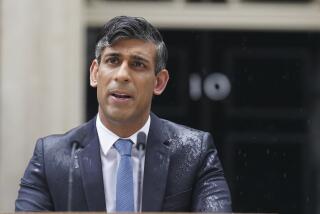British elections scheduled for May 6
- Share via
Reporting from London — Britain’s worst-kept secret was officially let out of the bag Tuesday when Prime Minister Gordon Brown announced that much-anticipated national elections would take place May 6.
The race is shaping up as the tightest in 18 years, and its outcome could be a rare “hung Parliament,” in which no party commands a sufficiently decisive majority to form a government. Polls consistently show the opposition Conservatives leading Brown’s ruling Labor Party, but the gap has narrowed significantly in recent months, making the contest too close to call.
Both parties, expecting the May 6 poll date, have already kicked into high campaign gear. So have the Liberal Democrats, a smaller grouping that could play kingmaker if a coalition government proves necessary.
With the nation barely out of recession, the unemployment rate at its highest in years and the government’s budget deficit on the rise, the economy has emerged as the No. 1 election issue. But Britain’s would-be leaders also face an angry electorate fed up with politics as usual, disgusted by a scandal involving members of Parliament who claimed items such as horse manure (for gardening) and moat-clearing as expenses on the public dime.
Much of the voter ire is directed at Brown’s Laborites, who have been in power for 13 years. The Conservatives, or Tories, are hoping to capitalize on a mood of exhaustion with Labor, under whose rule the nation became bogged down in two wars, in Afghanistan and Iraq, and the worst recession since World War II.
“It’s the most important general election for a generation. And it comes down to this: You don’t have to put up with another five years of Gordon Brown,” the Conservative leader, David Cameron, told cheering supporters Tuesday morning at a rally not far from Parliament.
Telegenic and articulate, Cameron, 43, will be Britain’s youngest prime minister in nearly 200 years if his party captures a majority in the House of Commons. But Labor hopes to use his relative youth against him, calling him and his team too callow and inexperienced to take over the reins of government in such difficult times.
Labor’s argument could backfire. After all, Brown’s predecessor, Tony Blair, was just a few days shy of 44 when he took office in 1997.
The traditionally working-class Labor Party also ridicules Cameron’s “posh” background, a privileged upbringing that included an elite private school and Oxford University.
A photo of Cameron wearing tails and looking insouciantly indolent as a member of Oxford’s exclusive Bullingdon Club continues to haunt him here in class-conscious Britain. Last week, a spoof campaign poster showing Brown’s face and a challenge to Cameron -- “Step outside, posh boy” -- drew plenty of buzz.
The poster also alluded to the prime minister’s own image problems, though. A recent book paints Brown, 59, as a short-tempered semi-despot given to hurling his cellphone in anger and grabbing underlings by their lapels.
To counter those claims, Brown declared himself a team player and brought along his Cabinet when announcing the election date.
Following established protocol, he first paid a 20-minute visit to Queen Elizabeth II, who choppered in to Buckingham Palace to receive him, and formally requested permission to dissolve Parliament.
More to Read
Sign up for Essential California
The most important California stories and recommendations in your inbox every morning.
You may occasionally receive promotional content from the Los Angeles Times.











